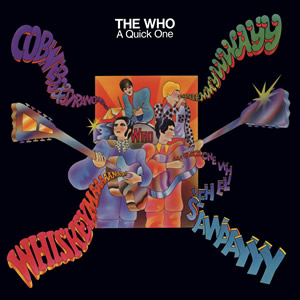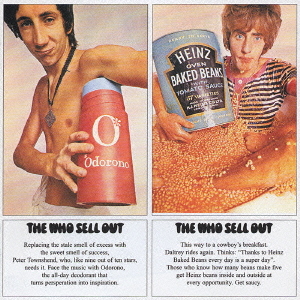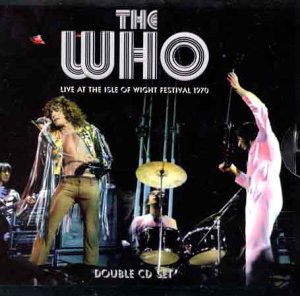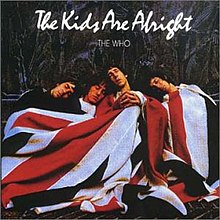
The Who are an English rock band formed in London in 1962. Their classic lineup (1964–1978) consisted of lead vocalist Roger Daltrey, guitarist Pete Townshend, bassist John Entwistle and drummer Keith Moon. They are considered one of the most influential rock bands of the 20th century and have sold over 100 million records worldwide. Their contributions to rock music include the development of the Marshall stack, large public address systems, the use of synthesisers, Entwistle's and Moon's influential playing styles, Townshend's feedback and power chord guitar technique, and the development of the rock opera. They are cited as an influence by many hard rock, punk, power pop and mod bands. The Who were inducted into the Rock and Roll Hall of Fame in 1990.

Quadrophenia is the sixth studio album by the English rock band the Who, released as a double album on 26 October 1973 by Track Records. It is the group's third rock opera, the previous two being the "mini-opera" song "A Quick One, While He's Away" (1966) and the album Tommy (1969). Set in London and Brighton in 1965, the story follows a young mod named Jimmy and his search for self-worth and importance. Quadrophenia is the only Who album entirely composed by Pete Townshend.

A Quick One is the second studio album by the English rock band the Who, released on 9 December 1966. A version of the album with an altered track listing was released under the name Happy Jack on Decca Records in April 1967 in the United States, where the song "Happy Jack" was a top 40 hit.

My Generation is the debut studio album by English rock band the Who, released on 3 December 1965 by Brunswick Records in the United Kingdom, and Festival Records in Australia. In the United States, it was released on 25 April 1966 by Decca Records as The Who Sings My Generation, with a different cover and a slightly altered track listing. Besides the members of the Who, being Roger Daltrey (vocals), Pete Townshend (guitar), John Entwistle (bass) and Keith Moon (drums), the album features contributions by session musician Nicky Hopkins (piano).

The Who Sell Out is the third studio album by the English rock band the Who. It was released on 15 December 1967 by Track Records in the UK and Decca Records in the US. A concept album, The Who Sell Out is structured as a collection of unrelated songs interspersed with fake commercials and public service announcements, including the second track "Heinz Baked Beans". The album purports to be a broadcast by pirate radio station Radio London. The reference to "selling out" was an intended irony, as the Who had been making real commercials during that period of their career, some of which are included as bonus tracks on the remastered CD.

The Who by Numbers is the seventh studio album by English rock band the Who, released on 3 October 1975 in the United Kingdom through Polydor Records, and on 6 October 1975 in the United States by MCA Records. It was named the tenth-best album of the year in The Village Voice Pazz & Jop critics poll.

It's Hard is the tenth studio album by English rock band the Who. Released in September 1982, it was the final to feature bassist John Entwistle, who died in 2002. It was also the second and final Who studio album with drummer Kenney Jones, as well as the last to be released on Warner Bros. Records in the US. It was released on Polydor Records in the UK, peaking at No. 11, and on Warner Bros. in the US where it peaked at No. 8 on the Billboard Pop Albums chart. The US rights to both this album and Face Dances subsequently reverted to the band, who then licensed them to MCA Records for reissue. The album achieved gold status by the RIAA in the US in November 1982. It was their last album for over two decades until Endless Wire in 2006.

Who Are You is the eighth studio album by the English rock band the Who, released on 21 August 1978 by Polydor Records in the United Kingdom and MCA Records in the United States. Although the album received mixed reviews from critics, it was a commercial success, peaking at number 2 on the US charts and number 6 on the UK charts.

Face Dances is the ninth studio album by English rock band the Who. It was released in 1981 by Warner Bros. in the United States and on Polydor in the United Kingdom. It is one of two Who studio albums with drummer Kenney Jones, who joined the band after Keith Moon's death three years earlier.

Meaty Beaty Big and Bouncy is a compilation album of singles by English rock band the Who, released in 1971 as Track 2406 006 in the UK and as Decca DL 79184 in the US. It entered the US Billboard 200 chart on 20 November 1971, peaking at number 11, and the UK chart on 3 December 1971, peaking at number 9.

Odds & Sods is an album of studio outtakes by British rock band the Who. It was released by Track Records in the UK and Track/MCA in the US in October 1974. Ten of the recordings on the original eleven-song album were previously unreleased. The album reached No. 10 on the UK charts and No. 15 in the US.

The Ultimate Collection is a 2002 two-disc greatest hits set by the Who with both singles and top hits from albums, all of which have been remastered. The compilation was released by Polydor Records internationally and on MCA Records in the U.S. The first 150,000 copies added a third disk with rare tracks and music videos. The album debuted on the Billboard 200 album chart on 29 June 2002, at No. 31 and hit No. 17 on the British charts. It was certified gold by the RIAA on 15 July 2002 and platinum on 13 March 2008.

Then and Now is a 2004 greatest hits compilation album by The Who released internationally by Polydor Records and by Geffen Records in the United States. It features 18 Who classics and two new tracks—"Real Good Looking Boy" and "Old Red Wine"—which were the first Who originals since "Dig" from Pete Townshend's 1989 album The Iron Man. "Real Good Looking Boy" is a tribute to Elvis Presley, and "Old Red Wine" is a tribute to former band member John Entwistle, who died in 2002. The album was re-released in 2007 and replaced "Old Red Wine" with "It's Not Enough" from the 2006 album Endless Wire and "Summertime Blues" was replaced by "Baba O'Riley".

Live at the Isle of Wight Festival is a double live album by The Who, recorded at the Isle of Wight Festival on 29 August 1970, and released in 1996. A DVD of the concert was also released for the first time in 1996.

Under a Raging Moon is the sixth solo studio album by English singer Roger Daltrey, released in September 1985 by Atlantic Records. The album reached No. 42 on the US charts, and the single "After the Fire", written by Pete Townshend, reached No. 48. It includes a tribute to Keith Moon, former drummer of the Who who died in 1978, on the track "Under a Raging Moon". In Canada, the album reached No. 33 on the RPM Magazine charts, and "After the Fire" reached No. 53.

The Kids Are Alright is a 1979 rockumentary film about the English rock band the Who, including live performances, promotional films and interviews from 1964 to 1978. It notably features the band's last performance with long-term drummer Keith Moon, filmed at Shepperton Studios in May 1978, three months before his death.

Who's Better, Who's Best: This Is the Very Best of the Who is a 1988 compilation album by the Who. A compilation of videos also titled Who's Better, Who's Best was released in 1988 as well.

Quadrophenia is the soundtrack album to the 1979 film Quadrophenia which refers to the 1973 rock opera Quadrophenia. It was initially released on Polydor Records in 1979 as a cassette and LP and was re-released as a compact disc in 1993 and 2001. The album was dedicated to Peter Meaden, a prominent Mod and first manager of The Who, who had died a year prior to the album's release.

The Who Collection is a compilation album by The Who, released in 1985. It is notable for containing a unique remix of "Won't Get Fooled Again" and for being one of the few compact disc appearances of the extended version of "Magic Bus".

Tommy is a soundtrack album by The Who with contributions from numerous artists. The soundtrack was used in the 1975 Tommy film that was based on the original album that was released by The Who in 1969. Pete Townshend oversaw the production of this double-LP recording that returned the music to its rock roots, and on which the unrecorded orchestral arrangements he had envisaged for the original Tommy LP were realised by the extensive use of synthesiser.



















